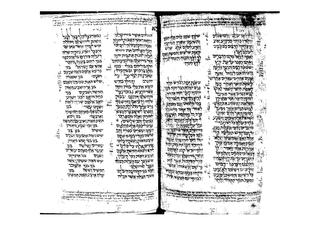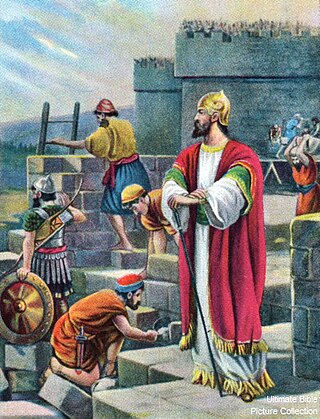The Book of Ezra is a book of the Hebrew Bible which formerly included the Book of Nehemiah in a single book, commonly distinguished in scholarship as Ezra–Nehemiah. The two became separated with the first printed rabbinic bibles of the early 16th century, following late medieval Latin Christian tradition. Composed in Hebrew and Aramaic, its subject is the Return to Zion following the close of the Babylonian captivity. Together with the Book of Nehemiah, it represents the final chapter in the historical narrative of the Hebrew Bible.

Moab is an ancient Levantine kingdom whose territory is today located in southern Jordan. The land is mountainous and lies alongside much of the eastern shore of the Dead Sea. The existence of the Kingdom of Moab is attested to by numerous archaeological findings, most notably the Mesha Stele, which describes the Moabite victory over an unnamed son of King Omri of Israel, an episode also noted in 2 Kings 3. The Moabite capital was Dibon. According to the Hebrew Bible, Moab was often in conflict with its Israelite neighbours to the west.
1 Esdras, also Esdras A, Greek Esdras, Greek Ezra, or 3 Esdras, is the ancient Greek Septuagint version of the biblical Book of Ezra in use within the early church, and among many modern Christians with varying degrees of canonicity. 1 Esdras is substantially similar to the standard Hebrew version of Ezra–Nehemiah, with the passages specific to the career of Nehemiah removed or re-attributed to Ezra, and some additional material.
The name "Esdras" is found in the title of four texts attributed to, or associated with, the prophet Ezra. The naming convention of the four books of Esdras differs between church traditions; and has changed over time.
Ezra–Nehemiah is a book in the Hebrew Bible found in the Ketuvim section, originally with the Hebrew title of Ezra. The book covers the period from the fall of Babylon in 539 BCE to the second half of the 5th century BCE, and tells of the successive missions to Jerusalem of Zerubbabel, Ezra, and Nehemiah, and their efforts to restore the worship of the God of Israel and to create a purified Jewish community. It is the only part of the Bible that narrates the Persian period of biblical history.

Nehemiah 1 is the first chapter of the Book of Nehemiah in the Old Testament of the Christian Bible, or the 11th chapter of the book of Ezra-Nehemiah in the Hebrew Bible, which treats the book of Ezra and the book of Nehemiah as one book. Jewish tradition states that Ezra is the author of Ezra-Nehemiah as well as the Book of Chronicles, but modern scholars generally accept that a compiler from the 5th century BCE is the final author of these books. This chapter describes Nehemiah's position in the Persian court and his piety.

Ezra 1 is the first chapter of the Book of Ezra in the Old Testament of the Christian Bible, or the book of Ezra–Nehemiah in the Hebrew Bible, which treats the book of Ezra and book of Nehemiah as one book. Jewish tradition states that Ezra is the author of Ezra–Nehemiah as well as the Book of Chronicles, but modern scholars generally believe that a compiler from the 5th century BCE is the final author of these books.

Ezra 10 is the tenth and final chapter of the Book of Ezra in the Old Testament of the Christian Bible, or the tenth chapter of the book of Ezra-Nehemiah in the Hebrew Bible, which treats the book of Ezra and book of Nehemiah as one book. Jewish tradition states that Ezra is the author of Ezra-Nehemiah as well as the Book of Chronicles, but modern scholars generally accept that a compiler from the 5th century BCE is the final author of these books. The section comprising chapters 7 to 10 mainly describes the activities of Ezra the scribe and the priest. This chapter and the previous one deal with the problem of intermarriage, especially the solution of it, ending with a list of those who sent away their "foreign" wives and children; a somber note which finds relief in the Book of Nehemiah, as the continuation of the Book of Ezra.

Nehemiah 2 is the second chapter of the Book of Nehemiah in the Old Testament of the Christian Bible, or the 12th chapter of the book of Ezra-Nehemiah in the Hebrew Bible, which treats the book of Ezra and the book of Nehemiah as one book. Jewish tradition states that Ezra is the author of Ezra-Nehemiah as well as the Book of Chronicles, but modern scholars generally accept that a compiler from the 5th century BCE is the final author of these books. From the time he hears about Jerusalem during the month of Kislev (November/December), Nehemiah waited until the month of Nisan (March/April) to petition Artaxerxes I of Persia to be allowed to go and help the rebuilding of Jerusalem. His petition is granted by the king, and although with less authority than Ezra over the officials of "Beyond-the-River", Nehemiah was given an official position with an escort of officers and cavalry.

Nehemiah 4 is the fourth chapter of the Book of Nehemiah in the Old Testament of the Christian Bible, or the 14th chapter of the book of Ezra-Nehemiah in the Hebrew Bible, which treats the book of Ezra and the book of Nehemiah as one book. Jewish tradition states that Ezra is the author of Ezra-Nehemiah as well as the Book of Chronicles, but modern scholars generally accept that a compiler from the 5th century BCE is the final author of these books. This chapter recounts how the Jews had to militarize the building of the wall due to the constant threat from their enemies.
Nehemiah 5 is the fifth chapter of the Book of Nehemiah in the Old Testament of the Christian Bible, or the 15th chapter of the book of Ezra-Nehemiah in the Hebrew Bible, which treats the book of Ezra and the book of Nehemiah as one book. Jewish tradition states that Ezra is the author of Ezra-Nehemiah as well as the Book of Chronicles, but modern scholars generally accept that a compiler from the 5th century BCE is the final author of these books. This chapter records the reform of Nehemiah in the case of economic oppression among the Jews, and shows how he led by example.

Nehemiah 6 is the sixth chapter of the Book of Nehemiah in the Old Testament of the Christian Bible, or the 16th chapter of the book of Ezra-Nehemiah in the Hebrew Bible, which treats the book of Ezra and the book of Nehemiah as one book. Jewish tradition states that Ezra is the author of Ezra-Nehemiah as well as the Book of Chronicles, but modern scholars generally accept that a compiler from the 5th century BCE is the final author of these books. This chapter records the continuing opposition to Nehemiah from sources both external and internal.

Nehemiah 7 is the seventh chapter of the Book of Nehemiah in the Old Testament of the Christian Bible, or the 17th chapter of the book of Ezra-Nehemiah in the Hebrew Bible, which treats the book of Ezra and the book of Nehemiah as one book. Jewish tradition states that Ezra is the author of Ezra-Nehemiah as well as the Book of Chronicles, but modern scholars generally accept that a compiler from the 5th century BCE is the final author of these books. This chapter records the joint appointments of Hanani and Hananiah over Jerusalem and the second appearance of the Golah ("exiles") list, that is, the list of the first returning group of Jews from Babylon, which was documented earlier in Ezra 2 with few variations.

Nehemiah 8 is the eighth chapter of the Book of Nehemiah in the Old Testament of the Christian Bible, or the 18th chapter of the book of Ezra–Nehemiah in the Hebrew Bible, which treats the book of Ezra and the book of Nehemiah as one book. Jewish tradition states that Ezra is the author of Ezra-Nehemiah as well as the Book of Chronicles, but modern scholars generally accept that a compiler from the 5th century BCE is the final author of these books. This chapter and the next focus mainly on Ezra, with this chapter recording Ezra's reading and instructing God's law to the people, then together they celebrated the Feast of Tabernacles with great joy. Nehemiah the governor is mentioned briefly in verse 9 but Smith-Christopher argues that "the presence of Ezra and the virtual absence of Nehemiah support the argument that chapter 8 is among the displaced chapters from the Ezra material", and suggests that "the original place for [this chapter] would logically have been between Ezra 8 and 9".

Nehemiah 11 is the eleventh chapter of the Book of Nehemiah in the Old Testament of the Christian Bible, or the 21st chapter of the book of Ezra-Nehemiah in the Hebrew Bible, which treats the book of Ezra and the book of Nehemiah as one book. Jewish tradition states that Ezra is the author of Ezra-Nehemiah as well as the Book of Chronicles, but modern scholars generally accept that a compiler from the 5th century BCE is the final author of these books. The chapter describes the repopulation of Jerusalem. Judahites (4-6), Benjamites (7-9), priests (10-14), Levites (15-18), gatekeepers (19) and "the rest of Israel" (20-21). Roles in relation to leadership, maintenance and prayer in the Temple are allocated. The people cast lots and 1 of 10 are to volunteer to live in the city whilst the remainder repopulate the surrounding areas.

Nehemiah 12 is the twelfth chapter of the Book of Nehemiah in the Old Testament of the Christian Bible, or the 22nd chapter of the book of Ezra-Nehemiah in the Hebrew Bible, which treats the book of Ezra and the book of Nehemiah as one book. Jewish tradition states that Ezra is the author of Ezra-Nehemiah as well as the Book of Chronicles, but modern scholars generally accept that a compiler from the 5th century BCE is the final author of these books. This chapter recounts the lineage of the priests and Levites and describes the dedication of the walls of Jerusalem, whose construction has been a primary concern since the beginning of the book.

Nehemiah 13 is the thirteenth chapter of the Book of Nehemiah in the Old Testament of the Christian Bible, or the 23rd chapter of the book of Ezra-Nehemiah in the Hebrew Bible, which treats the book of Ezra and the book of Nehemiah as one book. Jewish tradition states that Ezra is the author of Ezra-Nehemiah as well as the Book of Chronicles, but modern scholars generally accept that a compiler from the 5th century BCE is the final author of these books. This chapter addresses a series of problems handled by Nehemiah himself, which had arisen during his temporary absence from the land, with some similar issues to those related in Ezra 9–10 and Nehemiah 10.










